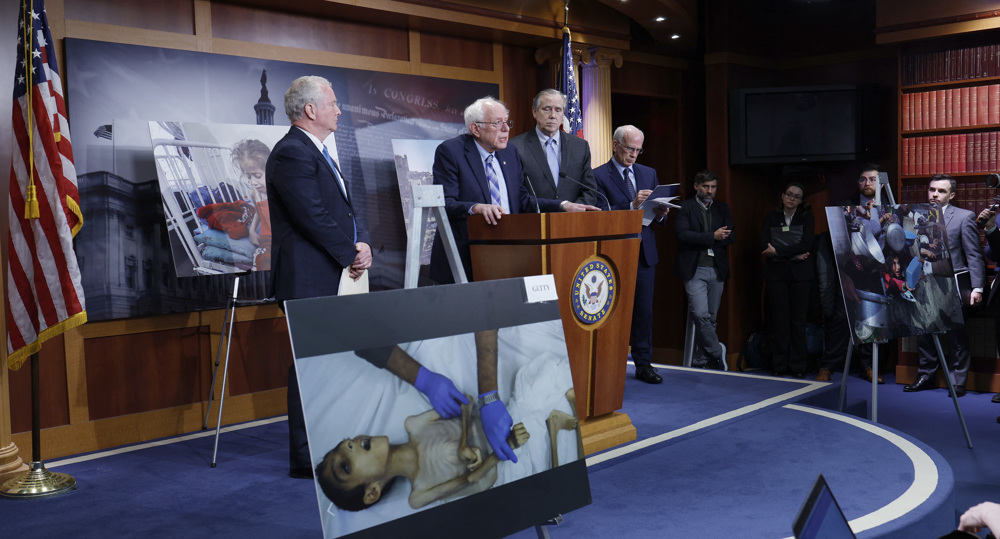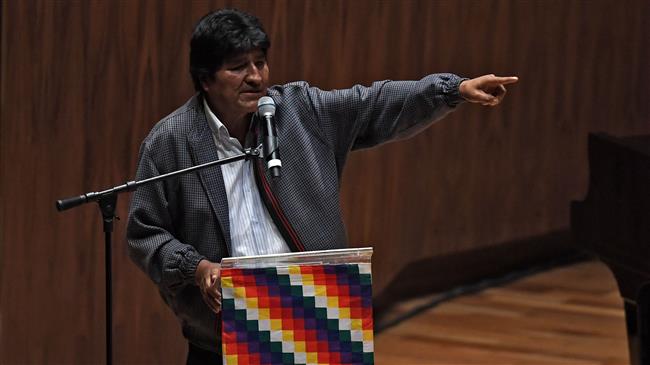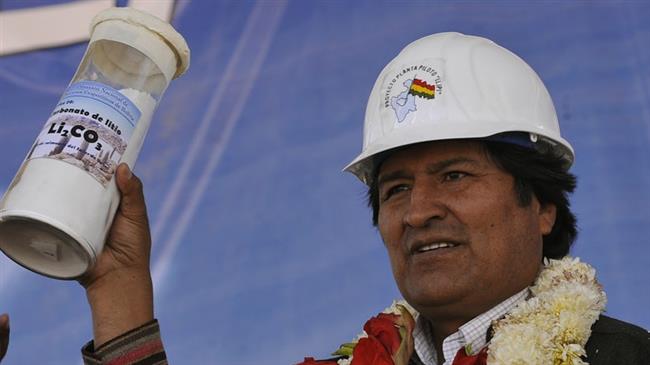Why the Trump regime toppled Bolivia’s Evo Morales
By Stephen Lendman
In a word, he wasn’t “our guy” in La Paz, Bolivia’s political capital.
He didn’t surrender the sovereign rights of the nation and people to US interests.
He was democratically elected and reelected four times, serving from January 22, 2006 until stepping down on November 10 to avoid greater CIA-orchestrated violence, vandalism and chaos.
US-installed, unelected, illegitimate, political nobody hardliner Jeanine Anez replaced him — supported by Bolivian military and police junta power.
A state of siege exists in the country, heavily armed security forces patrolling strategic areas in La Paz and elsewhere.
The coup d’etat regime is going all-out to eliminate challenges to its illegitimate power grab.
Anyone supporting democracy the way it should be, the rule of law, and wanting Morales returned as Bolivia’s legitimate president risks arrest and imprisonment on phony charges of terrorism and/or sedition.
US-installed fascist tyranny replaced Bolivia’s first indigenous president, the CIA gaining another imperial trophy.
Morales’ own words defined him. In 2010, Fidel Castro said he denounced NATO, a “war-mongering institution, using arrogant and uncouth language, proclaim(ing) its right to intervene in any country of the world wherever (its) interests were being felt to be threatened,” said Castro, adding:
US-dominated NATO “ignor(es) the fate of billions of people, and the real causes of poverty and suffering of most of the planet’s inhabitants.”
Morales “stated truths that will go down in history,” saying:
“Welcome to Bolivia, land of Tupac Katari, land of Bartolina Sisa, of Simon Bolivar, and of so many men who fought 200 years ago for the independence of Bolivia and many countries in the Americas,” adding:
“More than 180 years had to go by for us to make some profound transformations and incorporate these historically excluded sectors in Bolivia, and I hope I am not mistaken, I think it is the only country not just in the Americas but in the entire world where 50 percent of the ministers are women and 50 percent are men.”
“(A)fter the Constitution was approved by the Bolivian people in 2009, the most excluded, reviled people, those that were considered to be animals, those that were the indigenous movement, now they are represented in the Plurinational Legislative Assembly as well as in the departmental assemblies.”
“(W)e permit(ted) these indigenous brothers and sisters, who were left out and condemned to extermination, to be present…that had never happened before.”
“(F)ormer US ambassador Manuel Rocha (said) “don’t vote for Evo Morales. Evo Morales is the Andean Bin Laden and the coca growers are the Taliban.”
“Such accusations…bend the truth out of shape.” Hardliners in the US and Latin America falsely claim a “danger in the Andes, threats to democracy, to human rights” in Bolivia under Morales.
Castro added that “(o)ut of sheer modesty, Evo didn’t speak of the colossal advances obtained by the Bolivian people in matters of health,” adding:
“In the ophthalmological field alone, some 500,000 Bolivians had eye surgeries. Health services reach all Bolivians and about 5,000 General Comprehensive Medicine specialists are being educated and will shortly be graduated. That sister country of Latin America has more than enough reason to feel proud.”
In his September 24, 2019 address to the UN General Assembly, Morales said the following:
“We meet in this forum to discuss and find solutions to the serious threats facing humanity and life on the planet.”
“(M)illions of people (face) poverty, hunger, no potable water, losing their homes, forced displacement, more refugee crises, and new armed conflicts.”
“The arms race, military spending, technology at the service of death and the unscrupulous arms trade have increased.”
“The financial system remains undemocratic, inequitable and unstable, which privileges tax havens and the banking secrecy that subjects weak countries to accept conditions that perpetuate their dependence.”
“Inequality, hunger, poverty, the migration crisis, epidemic diseases, unemployment, are not just local problems, they are global problems.”
“Transnational companies control food, water, non-renewable resources, weapons, technology and our personal data. They intend to commercialize everything, to accumulate more capital.”
“The world is being controlled by a global oligarchy, only a handful of billionaires define the political and economic destiny of humanity.”
“(T)he root of the problem is the (predatory) capitalist system.”
“(T)he responsibility of our generation is to give the next a fairer and more human world.”
“That will only be achieved if we work together to consolidate a multipolar world, with common rules, defending multilateralism and the principles and purposes of the Charter of the United Nations and international law.”
Under his leadership, Bolivia’s economic growth increased fourfold, its unemployment Latin America’s lowest at 4.2% in 2018.
“Extreme poverty fell from 38.2% to 15.2% in 13 years. Life expectancy increased by 9 years.”
“The minimum wage rose from $60 to $310. The gender gap in land titling for women was reduced. 138,788 women received land in 2005 and 1,011,249 up to 2018.”
“Bolivia ranks third in the world with the highest participation of women in parliament. More than 50% of parliament is made up of women.”
“Bolivia was declared a territory free of illiteracy in 2008. School dropout rate fell from 4.5% to 1.5% between 2005 and 2018,” infant mortality reduced by 56%.
“We are in the process of implementing the Universal Health System, which will guarantee that 100% of Bolivians access a free, dignified service, with quality and warmth.”
Legislation was passed to provide free medical care for cancer patients. Key natural resources were nationalized.
“(B)asic services (including water, electricity, and telecommunications were recognized) as a human right.”
Morales’ ruling Movement for Socialism (MAS) party opposed US sanctions war on Cuba, Venezuela, and other countries.
He concluded his address, saying “we ratify our commitment to consolidate a new world order of peace with social justice, in harmony with mother earth to live well (vivir bien), respecting the dignity and identity of the peoples.”
All of the above made him a marked man for removal, bipartisan hardliners in Washington wanting him replaced by pro-Western puppet rule.
Self-exiled in Mexico, his democratic election voided, facing arrest on bogus terrorism and sedition charges if he returns home, the struggle for Bolivia’s soul continues in his absence.

Stephen Lendman, born in 1934 in Boston, started writing on major world and national issues began in summer 2005. In early 2007, radio hosting followed. Lendman now hosts the Progressive Radio News Hour on the Progressive Radio Network three times weekly. Distinguished guests are featured. Listen live or archived. Major world and national issues are discussed. Lendman is a 2008 Project Censored winner and 2011 Mexican Journalists Club international journalism award recipient.
Lendman’s newest book as editor and contributor is titled "Flashpoint in Ukraine: How the US Drive for Hegemony Risks WW III."
(The views expressed in this article do not necessarily reflect those of Press TV.)
Diplomat discourages recourse to pressure, intimidation, confrontation against Iran
UN: 2024 deadliest year for aid workers amid genocide in Gaza
Gaza health official warns of hospital shutdowns within 48 hours
Israel kills 5 more paramedics in southern Lebanon: Health ministry
Iran to launch ‘new, advanced’ centrifuges in response to IAEA resolution: AEOI
Yemen fires hypersonic missile at Israeli airbase
VIDEO | New Delhi chokes under toxic smog as air quality remains at hazardous levels
VIDEO | Press TV's news headlines















 This makes it easy to access the Press TV website
This makes it easy to access the Press TV website